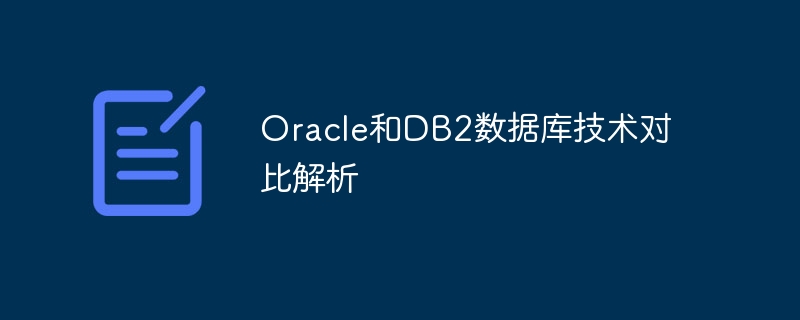
Oracle and DB2 are two well-known relational database management systems (RDBMS) that are widely used in enterprise-level applications. In this article, we will compare the two database technologies of Oracle and DB2 and analyze them in detail, including analysis of their characteristics, performance, functions and usage examples.
1. Overview of Oracle database technology
Oracle is a relational database management system developed by Oracle Corporation of the United States. It is widely used in enterprise-level applications and has strong performance, stability and security. Oracle provides a wealth of functions and tools to support complex data operations and management needs.
- Features:
- Support high concurrent access: Oracle has an excellent concurrency control mechanism that can support a large number of users accessing the database at the same time.
- Strong data security: Oracle provides multi-level security mechanisms, including user rights management, data encryption, etc., to protect the security of the database.
- Provide rich functions: Oracle has rich data processing and management functions, including stored procedures, triggers, indexes, etc., which can meet various complex business needs.
- Performance:
Oracle performs well when processing large-scale data and complex queries, with excellent performance. Its optimizer can automatically select the optimal execution plan based on query conditions and data volume to improve query efficiency.
- Usage example:
The following is a simple Oracle database operation example, create a table and insert data:
-- 创建表 CREATE TABLE employee ( id INT PRIMARY KEY, name VARCHAR(50), salary DECIMAL(10,2) ); -- 插入数据 INSERT INTO employee (id, name, salary) VALUES (1, 'Alice', 5000);
Copy after login
2. Overview of DB2 database technology
DB2 is a relational database management system developed by IBM and has good reliability and scalability. DB2 is widely used in enterprise-level applications and has powerful data processing and management functions.
- Features:
- Good reliability: DB2 adopts a high-reliability architecture design to ensure data security and reliability.
- Support large-scale data processing: DB2 performs well when processing large amounts of data and concurrent access, with good performance.
- Cross-platform support: DB2 supports a variety of operating systems and hardware platforms, and is suitable for deployment and use in different environments.
- Performance:
DB2 has excellent performance optimization functions, which can perform performance tuning according to different scenarios and needs, and improve the query and operation efficiency of the database.
- Usage example:
The following is a simple DB2 database operation example, create a table and insert data:
-- 创建表 CREATE TABLE employee ( id INT PRIMARY KEY, name VARCHAR(50), salary DECIMAL(10,2) ); -- 插入数据 INSERT INTO employee (id, name, salary) VALUES (1, 'Bob', 6000);
Copy after login
3. Comparative analysis of Oracle and DB2 technology
- Performance comparison:
Oracle has excellent performance when processing large-scale data and complex queries, while DB2 performs more outstandingly in reliability and scalability. Under different application scenarios and requirements, you can choose to use Oracle or DB2 according to the specific situation.
- Function comparison:
Both provide rich data processing and management functions in terms of functions, but Oracle pays more attention to data security and support of complex business requirements, while DB2 pays more attention to scalability and cross- Platform support.
Summary:
This article conducts a comparative analysis of the two database technologies, Oracle and DB2, and introduces their characteristics, performance, functions and usage examples. When selecting a database management system, it needs to be evaluated and selected based on specific business needs and circumstances to best meet the needs of the application.
The above is the detailed content of Comparative analysis of Oracle and DB2 database technology. For more information, please follow other related articles on the PHP Chinese website!






